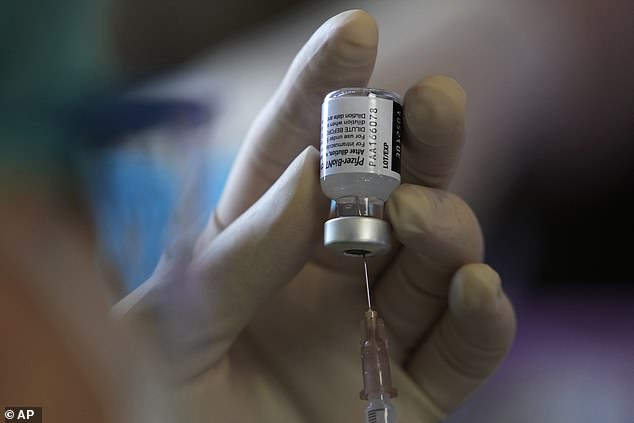Eradicating Covid is ‘probably feasible’ and it will be easier to eliminate than polio, scientists have claimed.
Vaccines, public health measures, such as face masks and social distancing, and ‘unprecedented’ global motivation could make it possible, according to researchers at the University of Otago in New Zealand.
But eliminating the coronavirus is ‘much less’ feasible than getting rid of smallpox, they say.
Factors including vaccine hesitancy and mutations that could make the virus more infectious or resistant to jabs could stand in the way.
Data shows 30 per cent of the world has now received a dose of a vaccine and 15.5 per cent are fully immunised, according to Our World in Data.
But only 1.1 per cent of people in low-income countries have received a single dose.
However, other top experts insist it will circulate for generations and eventually morph into an illness that resembles the common cold.

Securing a high vaccine uptake is one of the biggest burdens in eradicating Covid, along with the risk of more contagious or vaccine-resistant variants of the virus, according to researchers. Pictured: health worker administering a dose of the Pfizer Covid vaccine
WHAT IS POLIO?
Poliomyelitis (polio) is a serious viral infection that used to be common all over the world.
Polio cases fell dramatically when routine vaccination was introduced in the mid-1950s, with no cases being caught in the UK since the mid-80s.
Experts estimated there were 350,000 cases in 125 endemic countries in 1999, but this fell dramatically to just 175 reported infections in 2019.
Most polio sufferers do not have symptoms and are unaware they have the infection.
Of those who develop symptoms, these tend to appear three-to-21 days after infection and include:
High temperatureSore throatHeadacheAbdominal painAching musclesNausea and vomiting
For up to one in 100 people, the virus causes temporary or permanent paralysis, which can be life-threatening if it affects their breathing muscles.
The virus can be spread through droplets in the air when an infected person sneezes or coughs, or if someone come into contacted with the faeces of an infected person.
There is no cure for polio, so treatment focuses on easing symptoms.
In the UK, jabs are available as five separate doses as part of the NHS routine childhood vaccination programme.
Infection rates are highest in Pakistan and Afghanistan.
Source: NHS and World Health Organization
Advertisement
Polio used to be common around the world but cases fell dramatically in the mid-1950s when routine vaccinations were introduced.
There hasn’t been a case in the UK since the 1980s.
Two strains of the virus behind polio have already been declared eradicated.
The only other one known to exist has been spotted in two countries.
Meanwhile, smallpox was declared to be eradicated by the World Health Organization in 1980.
In an article published in journal BMJ Gobal Health today, experts considered 17 factors that contributed to the elimination of smallpox, or are relevant for getting rid of Covid and polio.
These included vaccine effectiveness, how transmissible each virus is and how concerned people and governments are about the disease.
Experts gave the factors a score out of three in relation to each virus, with a higher figure meaning that factor was likely to help achieve eradication.
Covid had a mean score of 1.6, while smallpox received 2.7 and polio was calculated at 1.5.
Factors in favour of eliminating the coronavirus – and where it scored higher than the other illnesses – included the massive health, social and economic consequences of the pandemic and an ‘unprecedented’ global interest in controlling the disease, scientists said.
Public health measures – including border controls, social distancing, hand washing, ventilation, face masks and contact tracing – can compliment the rollout of Covid jabs, which can also help eliminate the virus, they found.
Meanwhile, factors making it more difficult to get rid of Covid include vaccine hesitancy and variants that could be more infectious or vaccine resistant.
But there are limits to how much the virus can evolve, so when it reaches ‘peak fitness’, current vaccines can be tweaked.
Other challenges include the cost of jabs, ‘vaccine nationalism’ – with countries receiving disproportionately more doses than others – and governments with ‘anti-science aggression’.
Animals catching and transmitting the virus is another risk, the scientists said, but it so far seems to be ‘fairly rare’ for pets to catch the virus and when they do, they don’t seem to re-infect humans.
Experts said their findings shows that further work to determine whether the world should be aiming to eradicate the virus.
The World Health Organization should lead this effort, but it could also be done by national bodies working together, they said.
Scientists need to consider whether Covid is achievable through available means and whether the benefits of it outweigh the costs, the researchers concluded.
The researchers, who were led by public health expert Professor Nick Wilson, said in the paper: ‘While our analysis is a preliminary effort with various subjective components, it does seem to put Covid-19 eradicability into the realms of being possible.’
But Professor Paul Hunter, an infectious disease expert at the University of East Anglia, said yesterday the virus will never be eradicated, but instead will become an endemic and circulate for generations.
Some scientists believe the virus will eventually morph into one that just causes a common cold, as immunity builds up over time, removing the need for stricter public health measures.
Source link : https://www.dailymail.co.uk/news/article-9879541/Covid-easier-eradicate-Polio-people-desperate-pandemic-end.html











